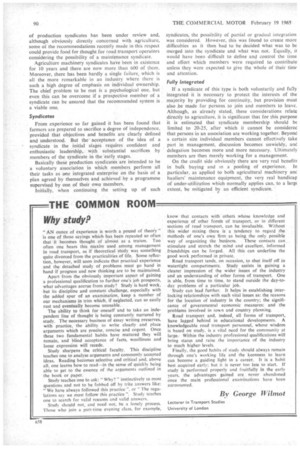THE COMMON ROOM Why study?
Page 92

If you've noticed an error in this article please click here to report it so we can fix it.
"AN ounce of experience is worth a pound of the*" is one of those sayings which has been repeated so often that it becomes thought of almost as a truism. Too often one hears this maxim used among management in road transport, as if theoretical study was something quite divorced from the practicalities of life. Some reflection, however, will soon indicate that practical experience and the detached study of problems must go hand in hand if progress and new thinking are to be maintained. Apart from the obviously important aspect of gaining a professional qualification to further one's job prospects, what advantages accrue from study? Study is hard work, but its discipline and constant challenge, especially with the added spur of an examination, keep a number of our mechanisms in trim which, if neglected, can so easily rust and eventually become unusable.
The ability to think for oneself and to take an independent line of thought is being constantly nurtured by study. The necessary business of essay writing preserves, with practice, the ability w write clearly and place arguments which are precise, concise and cogent. Once these two fundamental habits have matured they will remain, and blind acceptance of facts, woolliness and loose expression will recede.
Study sharpens the critical faculty. This discipline teaches one to analyse arguments and commonly accepted ideas. Reading becomes selective and critical and, above all, one learns how to read—in the sense of quickly being able to get to the essence of the arguments outlined in the book or paper.
Study teaches one to ask: "Why?" instinctively to most questions and not to be fobbed off by trite answers like: "We have always followed this practice ", or "The regulations say we must follow this practice ". Study teaches one to search for valid reasons and valid answers.
Study should not, and need not, be a lonely process. Those who join a part-time evening class, for example, know that contacts with others whose knowledge and experience of other form's of transport, or in different sections of road transport, can be invaluable. Without this wider mixing there is a tendency to regard the methods of one's own firm as being the only possible
way of organizing the business. These contacts can stimulate and stretch the mind and excellent, informed friendships can be forged. All this can underline the good work performed in private.
Road transport tends, on occasion, to shut itself off in watertight compartments. Study assists in gaining a clearer impression of the wider issues of the industry and an understanding of other forms of transport. One is able, from time to time, to stand outside the day-today problems of a particular job.
Study can lead further. It helps in establishing interlocking relationships with such vital issues as: the reasons for the location of industry in the country; the significance of governmental economic measures: and the problems involved in to and country planning.
Road transport and, indeed, all forms of transport, have lagged behind in educational developments. A knowledgeable road transport personnel, whose wisdom is based on study, is a vital need for the community at large. Within the industry professional qualifications will bring status and raise the importance of the industry to much higherlevels.
Finally, the good habits of study should always remain through one's working fife and the keenness to learn can become a guiding light in a career. It is a habit best acquired early: but it is never too late to start. If study is performed properly and fruitfully in the early years, the advantages gained are never abandoned once the main professional examinations have been surmounted.
By George Wilrnot
Lecturer in Transport Studies University of London




































































































































